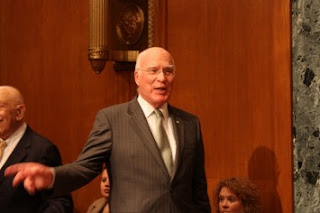By Andrew Ramonas | June 16, 2010 2:11 pm
The Justice Department will put into action additional oversight of the Patriot Act, the Senate Judiciary Committee announced Wednesday.
Panel Chairman Patrick Leahy (D-Vt.), who introduced Patriot Act renewal legislation last year, urged Attorney General Eric Holder in March to implement safeguards for the use of Patriot Act even though they are not required by law.
In a letter to Leahy dated Tuesday, DOJ Inspector General Glenn Fine wrote that the DOJ Office of the Inspector General plans to review many of programs for which Leahy asked for additional oversight.
“[W]hile our review may not address every one of the specific provisions that were contained in [Leahy's bill], we anticipate that the results of our review will address many of the important issues reflected in the oversight provisions that were part of that bill,” Fine wrote.
The Senate Judiciary approved the legislation in October that would reauthorize the “lone wolf,” business records and “roving wiretap” powers in the Patriot Act and require additional civil liberties and oversight protections for four years.
The full Senate has yet to vote on the bill. The House Judiciary Committee also approved a Patriot Act extension bill that has since stalled on the House floor. The House bill includes the civil liberties and oversight protections, but the legislation would only renew the records and “roving wiretap” authorities.
The House and Senate bills also call for more restrictions on the use of national security letters, which are used by the FBI to obtain evidence without a court order.
In the letter, Fine said the review would look into the use of national security letters and the business records provision of the Patriot Act, as well as other issues.
A DOJ Inspector General report released in January found that the FBI inappropriately secured phone records through informal requests by post-it notes, telephone, e-mails and what the FBI called “sneak peeks.”
With the provisions set to expire at the end of 2009, Congress temporary extended the powers through Feb. 28, 2011, but did not include any of the proposed civil liberties and oversight provisions.
Here is a summary of the provisions:
- Lone wolf: Allows the government to track a target without any discernible affiliation to a foreign power, such as an international terrorist group. The provision only applies only to non-U.S. persons. It has never been used by the government.
- Business records: Allows investigators to compel third parties, including financial services and travel and telephone companies, to provide them access to a suspect’s records without the suspect’s knowledge.
- Roving wiretaps: Allows the government to monitor phone lines or Internet accounts that a terrorism suspect may be using, whether or not others who are not suspects also regularly use them. The government must provide the FISA court with specific information showing the suspect is purposely switching means of communication to evade detection.





No comments:
Post a Comment